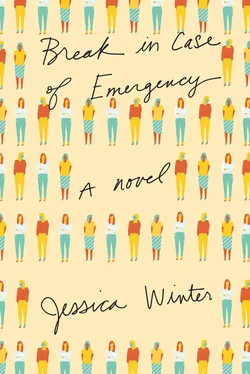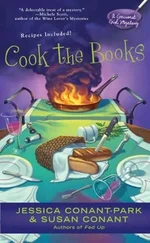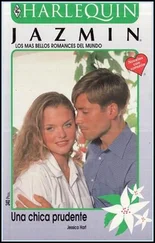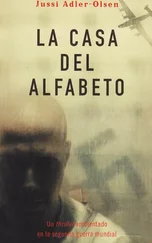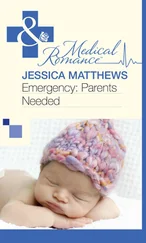“Do you want to go on a date with me?” Jim replied.
His faith-based position on Jen’s real artistic calling extended itself even to casual introductions at parties: “Please meet my wife, Jen; she’s an artist!” His stance wholly lacked in passive-aggression or latent accusation. To him it was simply a statement of fact, and the factual basis of the statement had no statute of limitations.
“You should use your free time to paint,” Jim would say during Jen’s unemployment. “Or at least do some drawing.”
“I should,” Jen would say.
“Just don’t make any art, ” Jim would say.
Sometimes Jim would come home to a new end table constructed out of stray dowels and disused neckties, two rhubarb pies cooling on the kitchen counter (one crust made with shortening, one not), and a calligraphic note — each letter written in alternating shades of glitter pen — informing him that Jen had volunteered to take the Aggression-Challenged Mixed Breeds at their local animal shelter for a walk. Upon her return, Jen would have much to download on a really interesting Guardian piece she’d read on the new patriarch of the Russian Orthodox Church and his stance on female clerics, and another really interesting Guardian piece she’d read on the civil conflict in Puthukkudiyiruppu, Sri Lanka.
Sometimes Jim would come home to the entire contents of their bookcase redistributed across the floor of the front room in short stacks, as if an inept soldier had begun fortifying his trench too late before the shelling started, and down the hall, his wife asleep on their bed — the bed itself sandbagged by half the contents of their closet — in gym socks and her bridesmaid’s dress from a cousin’s wedding.
“Are you home?” she asked, stirring from her nap in a flutter of tulle as Jim sat down gently on the edge of the bed. “Are you sick? Is it dark?”
There did exist what Jen and Jim called an “emergency fund,” parked in a liquid savings account that currently held $12,771.43, the amount that Jim’s mother had left him when she died after taxes plus several years of accrued interest at a median rate of 1.25 percent. They had always intended to add more than interest to it, as the fund was meant to provide extra feathering for the nest of the hypothetical tiny future boarder.
“There’s always the emergency fund,” Jim would say whenever Jen fretted about money.
“No, there isn’t,” Jen would say.
“There’s no emergency fund?” Jim asked the first time.
“There’s no emergency,” Jen said the first time.
They might have considered asking Jen’s parents for help, which Jen had done once before, as a twenty-three-year-old museum assistant facing a surprise tax bill. She had marked down the maximum number of exemptions on her W-4, mistaking “exemptions” for “deductions,” and thus assuming she would be paying her tax bill as she went. That mistake, combined with the fact that it hadn’t occurred to her that she’d have to pay taxes on the $5,000 art fellowship she’d won on graduation, meant that she found herself, on the second tax return of her postcollegiate life, owing the IRS $8,000.
“Which is incidentally still less than what Lily Bart owes Gus Trenor at the end of The House of Mirth, ” Pam pointed out to Jen at the time. “And that’s not even adjusting for inflation.”
Jen did not mention her tax bill to Meg.
When Jen asked her father for help, he offered to loan her the money at the current median rate for mortgage loans, which at that time hung around 7.5 percent. Two years, fixed rate. But first, Jen’s dad said, he needed to get sign-offs from Jen’s two brothers, because they might want a matching gift, which would only be fair.
“A matching loan, you mean,” Pam said. “You would all get matching loans.”
“I asked him that — my dad sees it as a gift,” Jen said. “He thinks he could do better than 7.5 percent in the markets, you see. So he would be coming out behind even with the interest.”
“Wait, he’s an investor?”
“He’s an associate district sales manager for a regional chain of sporting-goods stores.”
“Oh, right.”
Pam’s dad was an auto mechanic. On a road trip their senior year, after the stick on their borrowed manual-transmission heap fell slack and flailing on the freeway, Jen and Meg had watched Pam crawl under the car and pop the gear linkage into place.
“I’m sure he could get you a great deal on Champion sweatshirts, so long as you make your purchase somewhere in southern Ohio,” Jen said.
“What is his deal, though?” Pam asked.
“He’s into self-sufficiency,” Jen said. “That’s his deal. He grew up poor in a tough home. Both my parents, they just didn’t know things; they didn’t grow up with things. They used to keep the books in our house in a closet because they thought that was where they go. They didn’t know about fruit. Did you know that I was in college the first time I ever had an orange? Meg offered me an orange and I asked for a knife to cut it with.”
“I don’t remember that,” Pam said. Jen thought it was sweet that Pam assumed she would have been there.
There were things that Jen could say to Pam that she couldn’t say to Meg.
“Could you ask your mom for help?” Pam asked.
“Well, you know my mom,” Jen said. “I mean, you don’t, and that’s kind of the point — she’s in the picture, but she’s sort of blurred in the background, like you flap the Polaroid around and that patch just never comes into focus. It’s always felt like she’s been in another room. Talking to her is like pressing your ear to a wall.”
There was more Jen wanted to say, but she didn’t, because Pam’s own mother had died of cancer when Pam was a child.
“You should paint your mom,” Pam said.
“Anyway,” Jen said. “So my dad always comes back to ‘No one gave me anything and I turned out fine’—that kind of thing. Standing alone in the world. I respect that. Fairness is important to him.”
“Fairness isn’t necessarily incompatible with generosity,” Pam said.
“It is if you decide that fairness is the same as math.”
“Yeah. Or chemistry. Right? If you’re balancing a chemical equation, a little generosity is the same as cheating. Faking.”
“A rectangle doesn’t just shave a bit off two sides and loan the extra to a triangle so that the triangle can achieve her dream of becoming a square.” Jen semaphored the shapes with her hands.
“The rectangle must stay a rectangle,” Pam said.
Many weeks into her unemployment, Jen had a single-scene dream in which she opened the front door to her apartment to the sight of Franny, shaved to the skin, sitting startled at their doorstep upon a mat woven of her own downy calico fur. Instead of WELCOME, the mat read FEATHER YOUR NEST.
Around Valentine’s Day, Meg and Jen met for an early-evening drink at Tommy’s Bar in Midtown. The bartender was also the owner, and was also Tommy. Generations of Magic Marker graffiti covered the walls above the ripped, sticky leather booths. Supertramp was the most recent addition to the jukebox.
“So I don’t know whether this counts as a REAL JOB or an OTHER JOB,” Meg said, “but I’ll let you decide.”
In her nubby wool suit — black velvet collar, pencil skirt — and her glossy sweep of hair and her subliminal makeup (cheekbones dusted pink by an eternal cosmetic winter, liner applied so subtly that it simply supplanted the real curve of her upper lids), Meg personified brisk and frictionless glamour. She had always projected this, even in college, even during finals week — the undergraduate uniform of jeans, sweatpants, and puffer jackets on Meg became a form of drag. And Meg almost always seemed to have an egg timer ticking behind her eyes, long before gainful employment or law school or marriage or motherhood had placed any real-world requisitions on her time-management protocols. Even during the first carefree week of term or at Friday-night house parties, it was there: a buzz of impatience, palpable and exquisitely controlled. At eighteen and nineteen, Jen had found the buzz annoying, even egocentric. At twenty and beyond, she had learned to envy it — the way that Meg could apportion units of time like the facets of a jewel that she was coolly and constantly appraising. Jen saw it as a true measure of self-respect.
Читать дальше
